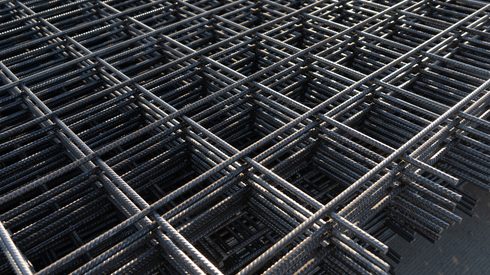Exports to Israel of a total of 54 items were banned with immediate effect from Tuesday. The list included steel rebar, wire rod and aluminium profiles. Finished goods such as steel towers, concrete mixers and forklifts also featured in the list.
“This decision will remain in force until Israel, within the framework of its obligations arising from international law, declares an immediate ceasefire in Gaza and allows a sufficient and uninterrupted flow of humanitarian aid to the Gaza Strip,” the Ministry of Commerce said.
More than 33,000 people have been killed by Israeli military action since the intensification of hostilities in Gaza in October 2023, according to the Ministry of Health in the Gaza Strip.
Supply of steel to Israel drops
The supply of Turkish long steel has been pivotal for Israel, with Turkey well established as Israel’s largest single provider of steel products.
Exports of Turkish rebar to Israel under harmonized standard (HS) code 7214 totaled 735,822 tonnes in 2023, according to Turkish customs data. This was down by 29.7% year on year from 1.05 million tonnes in 2022.
Shipment volumes had already been dropping significantly during the intensification of the conflict since October 7, 2023, given the logistics of shipping into a war zone and the reduced demand that was a result.
Rebar exports from Turkey to Israel dropped to 38,605 tonnes in October 2023, from 109,307 tonnes in September, and have since been fluctuating in a range of 19,000-38,000 tonnes per month, according to the latest data provided for January 2024.
In addition to Turkey, Israel’s principal providers of rebar have been the United Arab Emirates and Jordan. These two nations also oppose Israel’s actions in Gaza.
Political leaders in France, Egypt and Jordan warned Israel earlier this week that a threatened offensive against the southern Gazan city of Rafah would have “dangerous consequences.”
The situation could leave Israel scrambling for alternative steel suppliers, with some sources suggesting that it could lead to more supply from Russia going to the Middle Eastern nation.
Turkish rebar demand
The halt to steel exports to Israel could also cause problems relating to demand for Turkish rebar, given that Israel is the second-largest buyer of these exports after Yemen.
Yemen is itself entangled in the conflict. Houthi rebels based in the country have been responsible for attacks on commercial shipping in the Red Sea over recent months. In retaliation, air strikes have been launched on Yemeni territory by the US and the UK since the turn of the year.
“Hostilities in the Middle East will continue to hinder Turkish supplies there, although shipments to Yemen are reported still to be taking place. Turkey will keep looking for other outlets,” Fastmarkets steel analyst Paolo Frediani said last month.
Weak demand and pricing for Turkish rebar has caused rebar-scrap price spreads to hit multi-year lows in the country over the past month, meaning that Turkish steelmakers’ profit margins have come under greater pressure.
Fastmarkets’ weekly price assessment for steel reinforcing bar (rebar), export, fob main port Turkey was $585-590 per tonne on April 4.
The price averaged $585.25 per tonne in March 2024, down by a massive $144.75 per tonne from $730.00 per tonne in March 2023.
US scrap market considers consequences
The news was a potential blow to the US ferrous scrap export market, with market participants digesting the effect that the ban on exports of rebar and wire rod will have on the market, given Israel’s prominence as a buyer of Turkish finished steel.
Similar to the US, Turkey produces 72% of its steel via electric-arc furnaces and relies heavily on US-origin scrap for its furnace feedstock.
The export ban announcement followed news of a cargo sale to Turkey from the US East Coast on April 8, which offered some much-needed stability in a market beset by small price moves and with no clear direction recently.
An East Coast exporter sold a cargo comprising HMS 1&2 (80:20) priced at $384 per tonne CFR and shredded and bonus-grade scrap priced at $404 per tonne CFR. The deal was made on April 8 but emerged a day later. The prices were similar to those for a pair of cargoes reported on April 4, one sold by the same exporter.
The scrap requirement negated by the announcement could translate to 98% of the finished steel that will no longer be shipped. This would be a significant blow to a market that has been reported to be “trawling the bottom” for some time, sources said.
Finished steel demand was already weak, with mills buying on a hand-to-mouth basis to keep furnaces running.
But some sources were more skeptical of the consequences for the market, believing that they might be minimal if Turkish exporters were “able to find a workaround” to circumvent the rebar export ban.
There has been some suggestion in the market that the Ministry of Commerce’s decision to act now was related to Turkish President Recep Erdogan’s solid defeats in recent local elections, and that the ban was merely an attempt to shore up his failing popularity.
“Turkey will not cut off its nose to spite its face. There are always workarounds. I don’t foresee any effect, personally,” a US scrap source said of the development.
“Remember when the US banned [imports of] Chinese aluminium, and they sold it to [the US] through Mexico?” the same source said. “Talk is talk, money is everything. China sold extrusions to Mexico, who remelted them to ingots, and resold them to the US.”
To learn more about the steel market, as well as other raw materials that are critical to the construction industry, visit our dedicated construction industry page.






